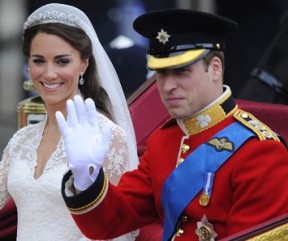 Two billion television viewers. A ceremony that was described by historian Simon Michael Schama as a wedding between not just Prince William and Catherine Middleton but the monarchy and the English people. A Sarah Burton dress that was the lace and tulle of modest tradition and the clean silhouette of modernity. Cameras that serenaded the cavernous walls of the Westminster Abbey to the extraordinary cadences of a choir. A decisively religious ceremony with just a hint of levity when Prince Harry caught the first glimpse of the bride and whispered a grin to his resolutely poised brother.
Two billion television viewers. A ceremony that was described by historian Simon Michael Schama as a wedding between not just Prince William and Catherine Middleton but the monarchy and the English people. A Sarah Burton dress that was the lace and tulle of modest tradition and the clean silhouette of modernity. Cameras that serenaded the cavernous walls of the Westminster Abbey to the extraordinary cadences of a choir. A decisively religious ceremony with just a hint of levity when Prince Harry caught the first glimpse of the bride and whispered a grin to his resolutely poised brother.
Lectures on marriage by men who will never know intimacy. Solemn hymns and prayers. The carriages, the crawling Phantoms, the hats, the morning dresses, the clock work precision with which the guests, the royals and the bride arrived and left. A crowd that was described by someone as human caviar. 15000 street parties.
In the end, the royal wedding really was about Britain’s sense of self, its pride in ceremony, in tradition and a monarchy that perhaps fulfils a nation’s need to see itself in an ornamental mirror. The royals are to Britain what Hollywood is to the US. Perhaps even more than that. The royals remind Britain of a sense of history and represent the idea of nationhood. For those who slept on pavements and sidewalks overnight to be able to catch a glimpse of Prince William and his bride as they drove down to the palace in an open chariot, this moment in history was full of joyful patriotism. Almost akin to what we felt when MS Dhoni and his boys brought home the cricket World Cup. Every nation needs to appreciate itself without cynicism, doubt and self-loathing and for some nations, soccer does it, for others, it is cinema, an Olympic medal or a charismatic leader/actor/cricketer, maybe a new fleet of aircrafts or a brand new nuke.
The air in London today was of an unspoken, “This is how we do it. This is what we stand for. This pageantry. These heritage buildings. These genteel, beautifully dressed people. This abbey resonating with history and romance and fragrant with faith.” The guests were a mix of the old and the new Britain coming together in a seamless mix, singing as one voice, with such elegant passion that even the driest of hearts moistened.  Today in England, Will and Kate represented all that is perfect, beyond reproach and symbolic of the young, more approachable, relatable face of monarchy.
Today in England, Will and Kate represented all that is perfect, beyond reproach and symbolic of the young, more approachable, relatable face of monarchy.
Interestingly, the BBC broadcast unlike the irreverent banter on CNN was deferential to the occasion, taking great care to talk about how solemn, special and significant the day was for people because it was about the merging of a working class commoner family with the bluest of blue blood. There were references to how Kate had conducted herself with great dignity and restraint throughout the courtship, implying that she would never embarrass the Family by talking to reporters about what happened behind the walls.
Only once was Diana mentioned today by a gushy guest who said that in America, people were glued to the wedding only because William was Diana’s legacy. Diana was, all said and done, the only royal in recent history with whom, even those who had no psychological stake in the monarchy, connected. She was in a way, the monarchy’s strongest and weakest link. A charismatic princess and a woman who challenged the idea of an undemonstrative, aloof monarchy out of touch with the real issues faced by its people.
Whatever may have been the perspective of the ordinary Britons who wore Will and Kate hats and waved the Union Jack and sang God Save The Queen with gusto (and one old woman scolded the young supposedly for not standing up when the national anthem played while her husband confessed that he welled up when the Queen emerged in her yellow dress from her car), those who watched the ceremony from geographical and historic distance and with detachment from all that the royal family stands for in Britain, missed Diana in the pews.
That things have changed perhaps from the time Diana and Charles got married was evident in the informality with which the couple communicated, in the way they showed real pleasure as they interacted with each other and the sea of people surging against their balcony.And ofcourse, there were the two kisses. Not one. But two. If the royal veneer and the varnish of duty will take away their spontaneity, only time will tell but as William said in his post engagement interview, he has learnt some lessons from the past.
Whatever our misgivings may have been about how this wedding was orchestrated as a global event, or if Britain needed to spend so much to keep the grandeur of a dream alive, the fact is that most of us watched it and felt what Simon Michael Schama summed up as the stirrings of a highest, nameless wisdom that can only spring from the innocence of a wedding day.
Reema Moudgil is the author of Perfect Eight. (http://www.flipkart.com/perfect-eight-reema-moudgil-book-9380032870) . More on Story Wallahs. Other books by Unboxed Writers in our Store






Every day from past many weeks,this wedding with all its details has been in my living room whether I like it or not!
Finally yesterday,I decided to be part of the celebrations! Got cakes and other yummy stuff ,clapped , whistled and became one with the crowd:)
I still dont know why?
Just think of it as a flamboyant stage show which was being overpublicised, and which you decided to watch and enjoy 🙂